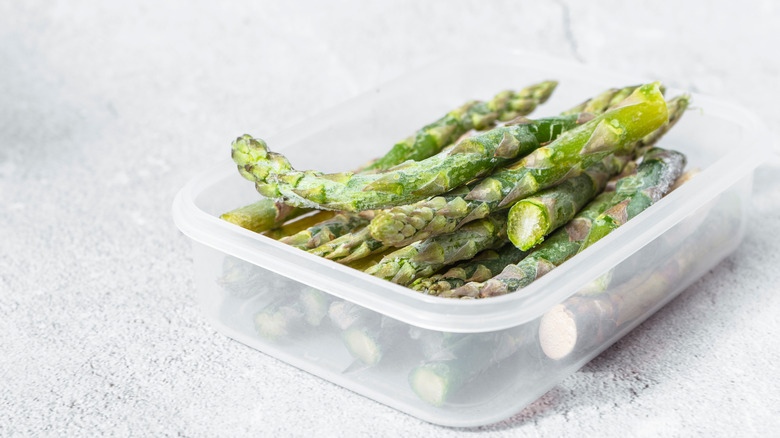The Best Method For Freezing Cooked Asparagus
There are many ways to cook asparagus from grilling or roasting to steaming and sauteing. But after you've cooked and enjoyed these delicious veggies, how do you preserve the leftovers? Refrigerating is a good idea, but it'll only keep the asparagus for about four days before it potentially goes bad. So if you don't plan on eating those tasty spears within that time, the best option is freezing.
Freezing cooked asparagus is a simple process. First, allow them to cool completely then divide into meal-sized portions. Pack the portions separately into resealable freezer bags and remove as much air as possible before sealing and arranging them in the freezer. Frozen asparagus can last in the freezer for up to six or eight months. However, we recommend eating them within two or three months for best results.
For easier handling, it's advisable to label each bag with the date, the name of the veggie, and even instructions on how to thaw the leftovers. This way, you'll be able to keep track of the lifespan of the asparagus and when anyone in your house grabs a portion, they'll know how to thaw them without wasting time researching the process or always pestering you with questions about how to do it. And speaking of thawing, here's how to do it properly.
How to thaw your asparagus and signs of spoilage to watch for
Once you're ready to eat your frozen cooked asparagus, there's actually no need to thaw them first. You can go straight to reheating from frozen. However, keep in mind that the texture of these veggies is bound to deteriorate to some extent depending on the original cooking method. For example, grilled or roasted asparagus spears may hold their shape better after freezing than the boiled version. Nevertheless, the best way to reheat frozen asparagus is by adding them to stew recipes, soups, or curries where their tender texture won't be a big deal. Let them cook with the rest of the dish until completely hot before serving.
Finally, once you've stored your cooked asparagus dish for any length of time, it's important to check for signs of spoilage before consuming it. Freezing doesn't make food invincible to spoilage because there may be unforeseeable factors like temperature fluctuations, or blackouts that may put your leftovers at risk. So look out for mold development, weird slippery texture, and strange foul odors. If you detect these in your asparagus, don't taste them, just toss them.

